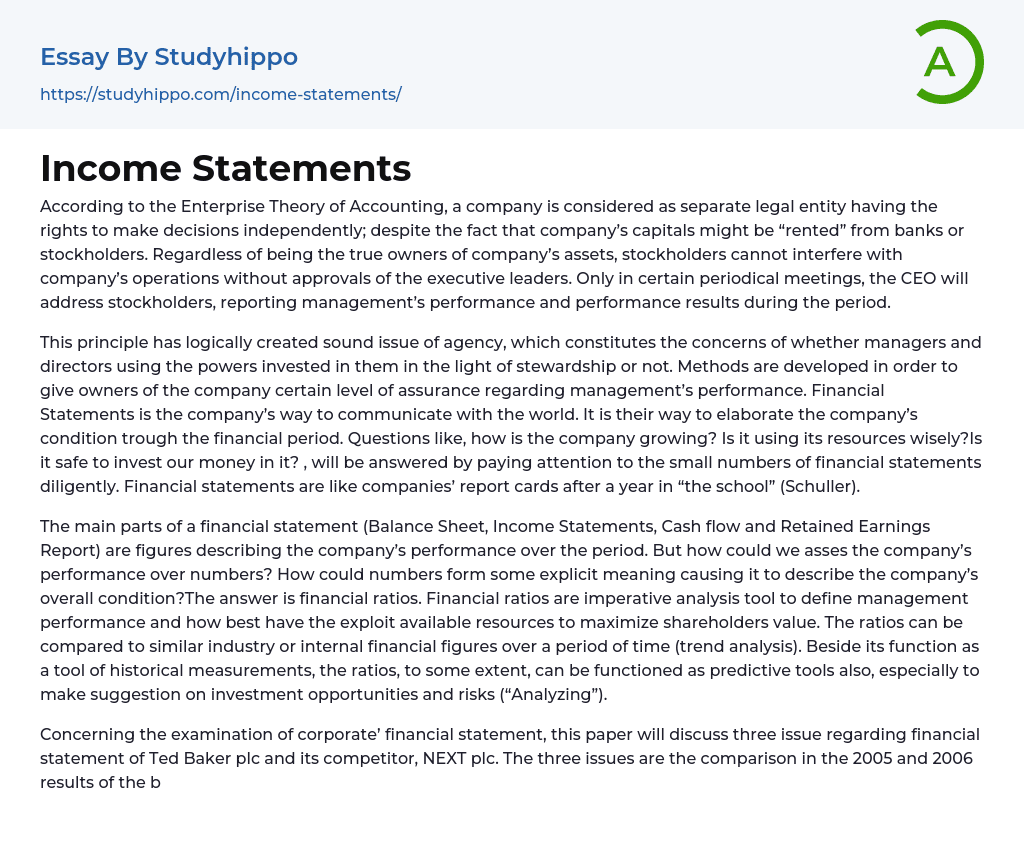As per the Enterprise Theory of Accounting, a company is an independent legal entity and holds the autonomy to make decisions irrespective of borrowing capital from banks or stockholders. Even though the stockholders are actual owners of the company assets, they cannot interfere in the business operations without the consent of executive leaders. The CEO shares management and performance results with stockholders only in certain periodic meetings.
The issue of whether managers and directors act as stewards or not has arisen due to the principle of agency. Methods have been developed to provide owners with assurance about management's performance. Financial Statements are how companies communicate their condition during the financial period. By examining the numbers in financial statements, questions such as the company's growth, resource utilization, and investment safety can be answered. Financial statements serve as a report card for companies
...after a year in "school." (Schuller).
Financial statements such as the Balance Sheet, Income Statements, Cash Flow, and Retained Earnings Report provide numerical representations of a company's performance during a specific period. However, understanding a company's overall condition through these figures may be challenging. Financial ratios serve as vital analysis tools for evaluating management performance and how efficiently available resources are utilized to maximize the value of shareholders. These ratios can be compared to similar industry figures or internal financial data over time through trend analysis. In addition to their historical measurement function, financial ratios can also be used as predictive tools, particularly in identifying investment opportunities and risks ("Analyzing").
In this article, we will discuss three issues related to the financial statements of Ted Baker plc and its competitor, NEXT plc. The issues includ
a comparison of Ted Baker plc's profitability, working capital position, and liquidity in 2005 and 2006; a comparison of results with NEXT plc; and an analysis of press articles that impacted the financial results of both companies.
- Perfect Competition essays
- Underwriting essays
- Synergy essays
- Valuation essays
- Bank essays
- Banking essays
- Corporate Finance essays
- Credit Card essays
- Currency essays
- Debt essays
- Donation essays
- Enron Scandal essays
- Equity essays
- Financial Accounting essays
- Financial Crisis essays
- Financial News essays
- Financial Ratios essays
- Financial Services essays
- Forecasting essays
- Foreign Exchange Market essays
- Free Market essays
- Gold essays
- Investment essays
- Legacy essays
- Loan essays
- Market Segmentation essays
- Money essays
- Personal finance essays
- Purchasing essays
- Retirement essays
- Shareholder essays
- Stock Market essays
- Supply And Demand essays
- Venture Capital essays
- Absolutism essays
- Appeal essays
- Bourgeoisie essays
- Contras essays
- Corporate Governance essays
- Corruption essays
- Democracy essays
- Democratic Party essays
- Developed Country essays
- Dictatorship essays
- Elections essays
- European Union essays
- Federalism essays
- Foreign essays
- Foreign policy essays
- Gentrification essays




